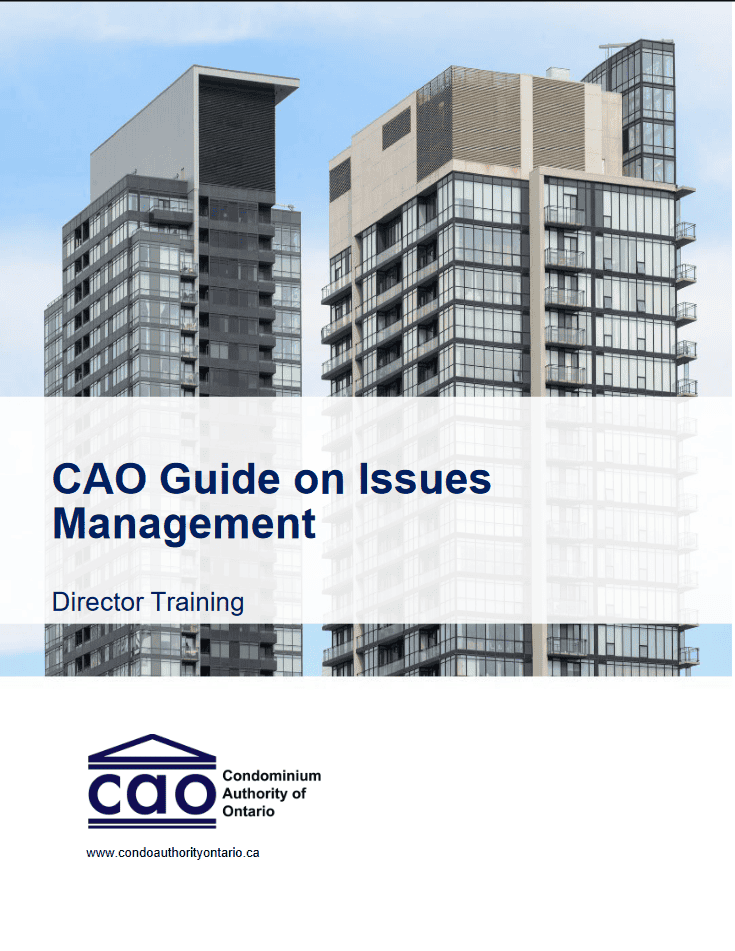GUIDE
CAO Guide on Issues Management
The Issues Management guide enhances CAO’s director training modules. This document provides information on principles and framework for issue management including providing helpful recommendations.
The guide will assist condo directors to identify, understand, resolve and monitor evolving common issues in condos. It covers principles of issue management, offers several tips and suggestions to implement best practices, identifies key roles and responsibilities, encourages a good documentation process and more.
Principles of issue management
Issues management refers to the practice of proactively and effectively dealing with problems to minimize or avoid more harm and disruption in the community. A sound issue management positively impacts the well-being of the condo owners.
Condo living comes with several benefits as well as some challenges as it is bound to happen when people live in spaces that are in close proximity of each other and share common elements. This can sometimes create conflict and tension and result in disagreements and disputes.
Some examples of emerging issues would be excessive costs for projects that take too long and cost extra money, long-drawn legal battles, a decrease in the market value of condo units, damage to the reputation of condo directors, and owners and criminal investigations. Conflict can happen because of a unit-owner’s lifestyle choices and can include noise, smoking, odour or infestation and more.
Some recommended practices of effective issues management when dealing with conflict are acting swiftly, getting help, and reacting appropriately.
Framework for issues management
Effective issues management practice has four steps:
1.- Identify
Common issues occur either because of the condo corporation’s current financial position and its financial outlook or from owners’ behaviour. For example, issues might include smoking, barbecues on balconies, noise issues, use or production of cannabis, pets, short-term rentals that breach rules and more.
Conflict can also be due to governance issues such as decisions made by the condo board, poor record keeping, dysfunctional condo boards, inconsistent application of condo by-laws or rules, external environmental issues such as increase in street crime, changes to municipal by-laws and more.
This section of the guide also has information on:
- Anticipating issues
- Inputs to budgeting and forecasting
- Emergency planning
- Other signals and indicators
- AGMs
- Importance of good documentation
2.- Evaluate
Once an issue has been identified, the condo board should assess the situation, understand the circumstances, and find out who’s involved and what to do about it. The 5Ws: what’s the issue, who does it involve, where did it take place, when, and why can help during the evaluation process. In case of complex evaluation, condo boards should seek the help of outside professionals.
This section of the guide also tackles topics such as:
- Understanding the core issue
- More complex evaluation – obtaining advice
- Assessing impacts and their severity
3.- Respond & Resolve
In this third step, condo boards may have several response options. The options available for most issues can be categorized into four reactions: Fix, mitigate, avoid and accept.
This section of the guide also has information on:
- Reducing the choices available and choosing the best option
- Options analysis – formal and informal
- Prioritization of options
- Developing the response
- Common issues and responses
- Other issues and responses
- Mediation and arbitration
- Assigning roles and responsibilities
4.- Track and monitor
Tracking and monitoring is an ongoing step in the issue management process that will help condo boards capture, assess and monitor changes to the issues and the attempted resolutions over time. Ideally, tracking and monitoring should begin as soon as an issue has been identified and should end when the issue is resolved.
The guide provides information on:
- Maintaining an issue log
- Monitoring issues
- Changes in issue status
- Effective communications
- Basic and advances activities for issues management
Director training overview
The Condo Authority has created mandatory Director Training Module on issues management for condo directors. The online training consists of 26 modules covering other important topics to help directors govern and carry out their responsibilities.
